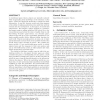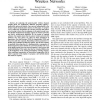76 search results - page 12 / 16 » Consequence analysis theory for alarm analysis |
SIGECOM
2006
ACM
14 years 1 months ago
2006
ACM
In traditional game theory, players are typically endowed with exogenously given knowledge of the structure of the game—either full omniscient knowledge or partial but fixed in...
KDD
2005
ACM
14 years 29 days ago
2005
ACM
This paper presents a framework for user-oriented text mining. It is then illustrated with an example of discovering knowledge from competitors’ websites. The knowledge to be di...
CORR
2008
Springer
13 years 7 months ago
2008
Springer
In analyzing the point-to-point wireless channel, insights about two qualitatively different operating regimes-bandwidth- and power-limited--have proven indispensable in the design...
AI
2005
Springer
13 years 7 months ago
2005
Springer
A theoretical framework for grounding language is introduced that provides a computational path from sensing and motor action to words and speech acts. The approach combines conce...
TON
2002
13 years 7 months ago
2002
In multi-hop networks, packet schedulers at downstream nodes have an opportunity to make up for excessive latencies due to congestion at upstream nodes. Similarly, when packets inc...


